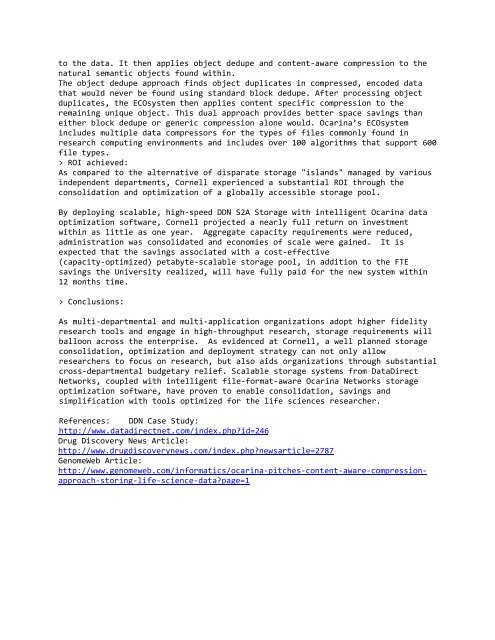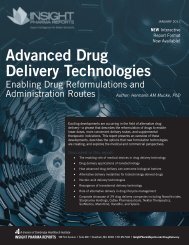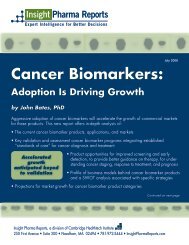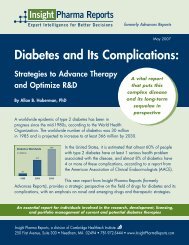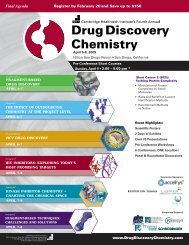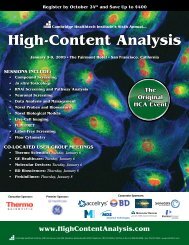2010 Best Practices Competition IT & Informatics HPC
IT Informatics - Cambridge Healthtech Institute
IT Informatics - Cambridge Healthtech Institute
- No tags were found...
You also want an ePaper? Increase the reach of your titles
YUMPU automatically turns print PDFs into web optimized ePapers that Google loves.
to the data. It then applies object dedupe and content‐aware compression to the<br />
natural semantic objects found within.<br />
The object dedupe approach finds object duplicates in compressed, encoded data<br />
that would never be found using standard block dedupe. After processing object<br />
duplicates, the ECOsystem then applies content specific compression to the<br />
remaining unique object. This dual approach provides better space savings than<br />
either block dedupe or generic compression alone would. Ocarina’s ECOsystem<br />
includes multiple data compressors for the types of files commonly found in<br />
research computing environments and includes over 100 algorithms that support 600<br />
file types.<br />
> ROI achieved:<br />
As compared to the alternative of disparate storage "islands" managed by various<br />
independent departments, Cornell experienced a substantial ROI through the<br />
consolidation and optimization of a globally accessible storage pool.<br />
By deploying scalable, high‐speed DDN S2A Storage with intelligent Ocarina data<br />
optimization software, Cornell projected a nearly full return on investment<br />
within as little as one year. Aggregate capacity requirements were reduced,<br />
administration was consolidated and economies of scale were gained. It is<br />
expected that the savings associated with a cost‐effective<br />
(capacity‐optimized) petabyte‐scalable storage pool, in addition to the FTE<br />
savings the University realized, will have fully paid for the new system within<br />
12 months time.<br />
> Conclusions:<br />
As multi‐departmental and multi‐application organizations adopt higher fidelity<br />
research tools and engage in high‐throughput research, storage requirements will<br />
balloon across the enterprise. As evidenced at Cornell, a well planned storage<br />
consolidation, optimization and deployment strategy can not only allow<br />
researchers to focus on research, but also aids organizations through substantial<br />
cross‐departmental budgetary relief. Scalable storage systems from DataDirect<br />
Networks, coupled with intelligent file‐format‐aware Ocarina Networks storage<br />
optimization software, have proven to enable consolidation, savings and<br />
simplification with tools optimized for the life sciences researcher.<br />
References: DDN Case Study:<br />
http://www.datadirectnet.com/index.php?id=246<br />
Drug Discovery News Article:<br />
http://www.drugdiscoverynews.com/index.php?newsarticle=2787<br />
GenomeWeb Article:<br />
http://www.genomeweb.com/informatics/ocarina‐pitches‐content‐aware‐compressionapproach‐storing‐life‐science‐data?page=1


